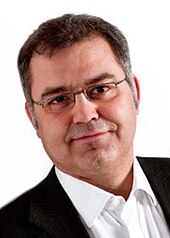Christoph Scheytt
Christoph Scheytt (born March 27, 1967 in Backnang / Württemberg) is a German electrical engineer and holder of the chair for circuit technology at the Heinz Nixdorf Institute at the University of Paderborn .
Career
From 1989 Scheytt studied electrical engineering at the Ruhr University in Bochum . He graduated in 1995. Scheytt then worked as a research assistant at the Chair for Integrated Circuits at the Ruhr University in Bochum. In 2000 Scheytt received his doctorate with distinction as Dr.-Ing. (Dissertation: "Bit rate flexible clock and data recovery circuits for bit rate transparent fiber optic systems").
At the same time, together with Günter Grau, he founded advICo microelectronics GmbH based in Recklinghausen, which he led as managing director. In 2006 Scheytt left advICo as managing director to accept an offer from Innovations for High Performance Microelectronics / Leibniz Institute for Innovative Microelectronics, Frankfurt (Oder) (IHP). In March 2006 he became head of the circuit design department at the IHP for Innovative Microelectronics.
Since March 2012, Scheytt has been head of the circuit technology department at the Heinz Nixdorf Institute .
Research priorities
Scheytt is an expert in the design of integrated circuits and systems based on nano / microelectronic chip technologies. The focus of his research work is on the one hand on chips for radio communication and radio sensors up to very high frequencies (a few GHz to over 300 GHz). On the other hand, he is researching chips for optical applications, e.g. B. for fast optical communication (up to over 400 Gbit / s), optical sensors and electronic-photonic signal processing. In addition to silicon technologies (CMOS, BiCMOS), innovative silicon photonics technologies are used for these circuit technologies, which make it possible to combine nano-photonic and nano-electronic circuits on one chip.
Applications of research work in the field of chips for radio technology relate to wireless communication at very high carrier frequencies (mm waves, THz) and RFID, as well as sensor applications such as vehicle radar, drone radar and industrial radio measurement technology. Applications in the field of chips for optical signals relate to fiber optic communication (wide area networks, data centers, quantum communication) and optical sensors (LIDAR for autonomous vehicles, gas sensors, spectroscopy), as well as electronic-photonic analog-digital converters and digital-analog converters .
More functions
Scheytt was involved in the development of one of the world's first 60 GHz transceivers for fast WLAN (802.11ad). He headed the EU project SUCCESS, in which the world's smallest radar system was developed and tested. As an author and co-author, Scheytt has more than 100 refereed conference papers and journal articles.
He holds more than 15 German and international patents.
Scheytt is chairman of the executive board of the Heinz Nixdorf Institute in Paderborn, board member of CeOPP (Center of Optopelectronics and Photonics Paderborn) and heads the priority program "Electronic-Photonic Integrated Systems for Ultrafast Signal Processing" (SPP2111) of the German Research Foundation (DFG).
Web links
| personal data | |
|---|---|
| SURNAME | Scheytt, Christoph |
| BRIEF DESCRIPTION | German electrical engineer and university professor |
| DATE OF BIRTH | March 27, 1967 |
| PLACE OF BIRTH | Backnang |
